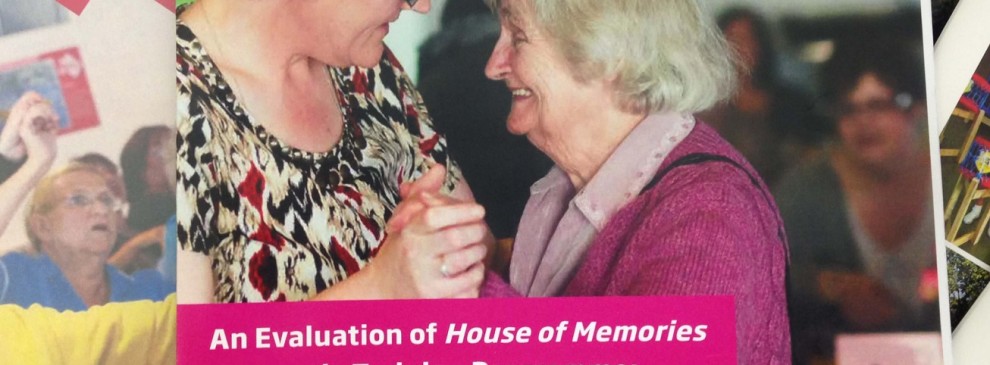Evaluation of House of Memories Northern Model 2013
NML commissioned the ICC to evaluate a regional roll-out of its acclaimed House of Memories initiative between February and May 2013. Originally funded by the Department of Health, the House of Memories health and social care model is a tailored dementia care training programme, which uses dramatic interpretation, curatorship, museum education and reminiscence therapy techniques to raise awareness of the condition, and enable professional health services, carers and families to help those directly affected live well with dementia. Developed and led by NML, House of Memories was delivered to 1200 participants during its initial phase at the Museum of Liverpool (January-March 2012), with a further 20 sessions delivered at the museum during ‘phase 2’ between October 2012 and March 2013 and supported by Liverpool Primary Care Trust.
House of Memories was extended across the North of England in February and March 2013, in collaboration with Salford Museum and Art Gallery, Bury Art Museum and Sunderland Museum and Winter Gardens. The full-day session was delivered in collaboration with training organisation AFTA Thought, who facilitated the morning segment using live theatre and interactive discussion. The afternoon session then included carousel taster activities led by museum and gallery staff, utilising available collections and dedicated House of Memories resources.
The evaluation considered the transferability, adaptability and impact of the House of Memories ‘Northern model’ in three separate and distinct museum and gallery services, including impact upon active participants with reference to the care and support of individuals living with dementia; partner museum and gallery services; and on services and activities for older people in the regions. The evaluation also focused on the ‘distance travelled’ for participants, identifying in the first instance expectations of the programme and motivations to attend. These included a strong desire to embed more empathic and intuitive professional care cultures within participants’ organisations and care services, and a growing preference for more creative, holistic, cost-effective training opportunities that can be readily cascaded back in the workplace. In this context, House of Memories had a profound impact in relation to the ‘culture of care’ across the three regions, which can be directly attributed to the strong empathic qualities and personal resonance inherent in the programme’s content, design and delivery.
The evaluation has revealed a demonstrable shift in participants’ cognitive and emotional understanding of dementia and its implications for those directly affected and carers alike. This includes an enhanced capacity for participants to consider and assess their own attitudes and performance, including ‘quickness to judge’ in care situations, leading to a more responsive, appropriate care relationship rather than over-use of reactive, ‘textbook’ methods. More significantly in relation to participants’ self-defined motivation to attend House of Memories, and within the context of national care policy drivers, participants were more actively taking time to consider and reflect on collective practice in the workplace, and providing a more supportive environment for colleagues drawing upon House of Memories in an active ‘frontline leadership’ capacity.
The value of House of Memories as a professional development intervention [and intermediary function between health service and beneficiary] should not be underestimated. In other evaluation and impact studies undertaken with the museums and cultural sector, its instrumental value (for example in relation to social outcomes such as health and education) is often contested due to problems with attribution and ‘proving’ that health outcomes are a direct result of the cultural intervention alone (Galloway, 2008), and concerns that prioritising instrumental impact in some way de-values the core professional identity and characteristics of cultural and creative sectors (Newman and McLean, 2004; West and Smith, 2005).
House of Memories overcomes each of these challenges, by considering the impact and value of the cultural assets and unique professional skills of museums to another professional group. House of Memories in this context has had a significant impact upon professional development in participating dementia care sectors, both in relation to the on-going practice of individual participants, and the extent to which the training is now being embedded and cascaded back within employing organisations. This includes the use of museum resources (e.g. memory suitcases) and museum visits with colleagues following House of Memories training amongst care home managers and frontline staff; the sharing of learning and experiences across different organisations and services; the active recommendation of House of Memories within and across organisations and services, demonstrating additional demand. Those participating organisations that do not provide direct care (e.g. with a training function) are also more actively engaged with the museums sector and appreciative of reminiscence therapy techniques.
Given the core ‘transferability’ and ‘adaptability’ objectives, the evaluation adopted a Realistic Evaluation approach (Pawson and Tilley, 1997), and considered in depth the situated, region-specific contexts, mechanisms [or practical House of Memories delivery methods] and outcomes throughout the roll-out process. Specific research methods included longitudinal pre and post training interviews with a stratified sample of health care participants from a range of organisations; participant observation of House of Memories training in action; and consultation with museum and gallery staff throughout the process. The methodological approach applied has enabled a detailed understanding of the contexts within which House of Memories is likely to be most effective, and the mechanisms required to ensure the most positive outcomes. Within the full evaluation, recommendations are subsequently made regarding any future roll-out and adaptation of the existing House of Memories model to ensure consistency in the quality of its delivery; to maximize the future impact of the programme according to its identified operational and strategic strengths; to consolidate the leadership role of NML; and to clearly articulate and reinforce the unique value of museum services.
The evaluation was led by the ICC’s Head of Research Kerry Wilson with support from Lauren Grindrod, Research Assistant in LJMU’s School of Humanities and Social Sciences (the summary evaluation report published by NML is available here). A briefing paper on the evaluation was prepared ahead of a parliamentary debate on House of Memories, led by Steve Rotheram MP on 4 June 2013 – the ICC was especially pleased to have helped substantiate the political significance of House of Memories within the context of core national policy agendas including the Prime Minister’s Challenge on Dementia (Department of Health, March 2012), which prioritised improved diagnosis rates; improved standards in hospitals, homes and domiciliary care; improved information provision for people with dementia and their carers; and better support for carers, and more recent health care policy directives identifying a ‘culture of compassion’ as a marker of success in NHS reform (Patients First and Foremost, Department of Health, March 2013).









